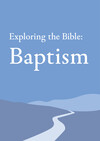

Are you sure?
This bookmark will be removed from all folders and any saved notes will be permanently removed.
Washed clean by spiritual baptism
• A family driving home after a holiday weekend starts debating a touchy issue. Within minutes, accusations are flying back and forth inside their little car. Quietly, a teenager in the back seat asks, "Has anybody thought about praying?" Everyone agrees (a little sheepishly) to listen to God for a few minutes. Afterward, there are soft looks all around, apologies, and healing.
• A young couple are dating and very much in love. They plan to be married someday. But in the meantime, it sometimes seems awfully hard not to show their love in physical ways, ways they both want to save till after they're married. So they ask God to help them wash their love clean—to help them build a more spiritual, more "forever" kind of love. And their prayers are answered.
• A senior citizen wakes up every morning with pain and other strange sensations. He's afraid to play golf or even do his yardwork. So he starts to pray. And he asks a Christian Science practitioner to pray with him. From morning until evening, he immerses himself in learning more of God and His Christ, through ideas he finds in the Bible and in Mary Baker Eddy's writings. Gradually, his whole life is bathed in new light and purpose. And soon, he's healed.
Enjoy 1 free Sentinel article or audio program each month, including content from 1898 to today.
JSH Collections
This article is included in:
2025 - DIGITAL COLLECTION
Exploring the Bible: Baptism
JSH-Online has hundreds of pamphlets, anthologies, and special editions for you to discover.

January 3, 1994 issue
View Issue-
from the Editors
The Editors
-
Nothing but the child of God!
Tony Lobl
-
How can prayer affect the body?
Diane Benedict-Gill
-
When calling upon God's power
Jan Johnston
-
From motorbikes to metaphysics
Richard E. Coote
-
FROM HAND TO HAND
E. M.
-
Letters to the PRESS—and other articles
Stephanie Margo Davis
-
True perception—and healing
Käte Meier
-
Washed clean by spiritual baptism
Mary Metzner Trammell
-
Just a trip around the sun
Russ Gerber
-
"I will say to the north, Give up; and to the south, Keep not...
Delores F. Bohling
-
I am truly grateful for Christian Science, especially for its...
Julia Joy Makin
-
How can one be obedient to NO SMOKING signs permanently?...
Sylvia M. Sawitsky
-
About four years ago my girlfriend and I would go jogging...
Nancy L. Shepherd


